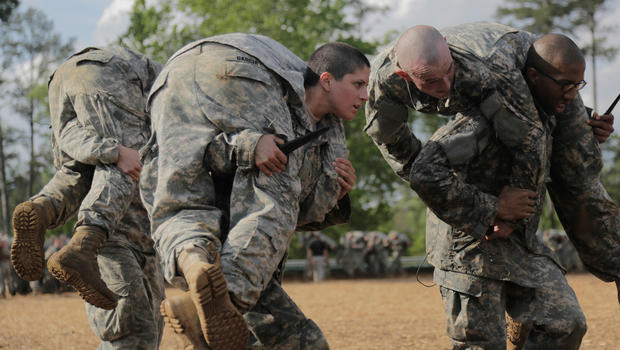
Friday morning, two West Point graduates — Captain Kristen Griest and First Lieutenant Shaye Haver — will make history as the first women to graduate from the Army’s intensely demanding Ranger School. Their remarkable accomplishment is a monumental milestone in the progress of women in the U.S. armed forces — and should end the debate about whether women are capable of serving in all combat positions.
Ranger School holds an immense symbolic significance in the Army. The Ranger tab on a soldier’s left shoulder elicits immense respect and admiration, perhaps even more so from the 97% of soldiers who will never earn the right to wear it. Most soldiers would characterize the more-than-two-month-long small-unit leadership course as the toughest test the Army can devise short of actual combat. Ranger students patrol across the roughest terrain in small groups at night week after week, often subsisting on one meal a day with only a few hours of sleep, while leading arduous missions that are ruthlessly graded by experienced Ranger instructors.
Only 42% of those who start the three-phase course ultimately graduate, and of those, more than one-third repeat at least one phase. Griest and Haver have been in the course since April and repeated the first phase twice before plowing nonstop through the other two phases. Griest, a military police officer, and Haver, an Apache helicopter pilot, will return to their units equipped with new leadership skills and the mental toughness that comes from gutting it out to succeed in the face of immense physical and mental stress.
Yet they will not be allowed to immediately serve in infantry jobs, Army special forces, or in the Ranger Regiment. These units remain closed to women, though that may change soon. In 2013, then-Secretary of Defense Leon Panetta officially declared all military positions open to women as of Jan. 1, 2016. The services have until that date to request and justify any exemptions that would keep specific positions closed. That means that in a few short months, current Secretary of Defense Ash Carter will make the final decision about which positions, if any, in the armed forces will remain closed to women.
Recent reporting suggests that the Army, Air Force, and Navy may not request any exceptions at all. The Marine Corps still has some concerns about women serving in the infantry, but the two female Ranger school graduates will make it far harder for the Marines to successfully argue that their infantry positions are so different from the Army’s that they should remain closed to women.
Captain Griest and Lieutenant Haver will be rightfully celebrated for shattering what some have called the “brass ceiling.” They have indisputably proven that women can meet the toughest standards required for the military’s most demanding ground combat assignments. Their success means that there should no longer be any limits on what women can do in the U.S. military – and that will make the entire armed forces a better and more formidable fighting force. Well done, Rangers!
Lt. General David W. Barno, USA (Ret.) is a Distinguished Practitioner in Residence, and Dr. Nora Bensahel is a Distinguished Scholar in Residence, at the School of International Service at American University. They are also Nonresident Senior Fellows at the Atlantic Council, and write the Strategic Outpost column at War on the Rocks. During his active duty career, Barno commanded a Ranger battalion and served three tours in the 75th Ranger Regiment.
More Must-Reads From TIME
- The 100 Most Influential People of 2024
- The Revolution of Yulia Navalnaya
- 6 Compliments That Land Every Time
- Stop Looking for Your Forever Home
- If You're Dating Right Now , You're Brave: Column
- The AI That Could Heal a Divided Internet
- Fallout Is a Brilliant Model for the Future of Video Game Adaptations
- Want Weekly Recs on What to Watch, Read, and More? Sign Up for Worth Your Time
Contact us at letters@time.com